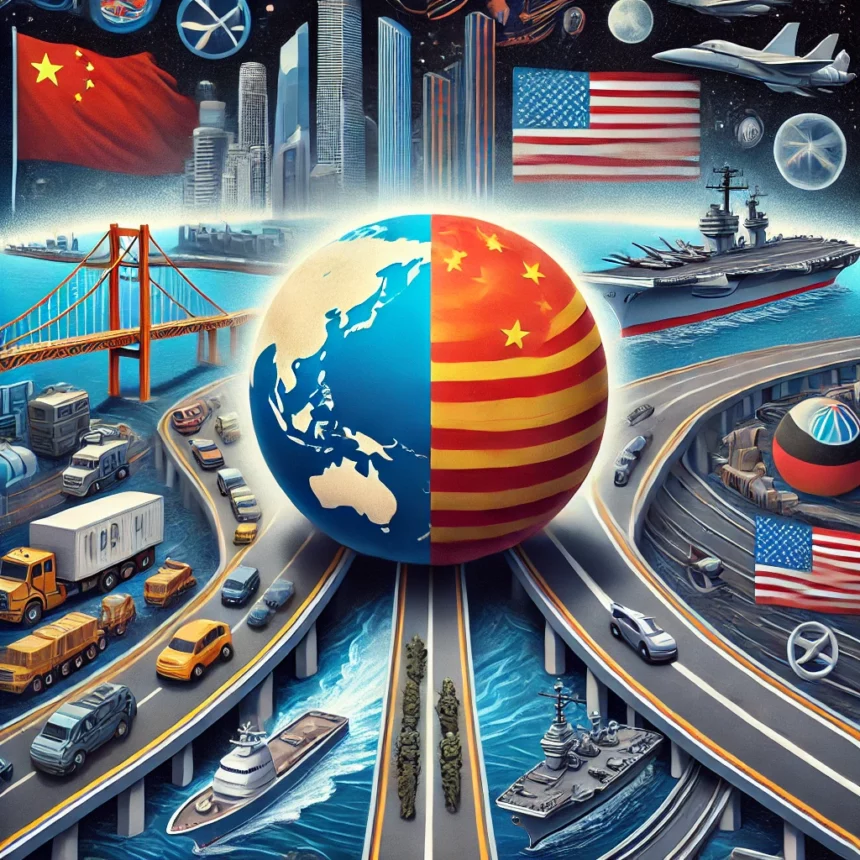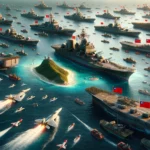The article debates the pathways differing between the United States and China to global influence: whereas the U.S. is more dependent on military might vis-à-vis a rules-based international order, the challenge is not on its hard power but on its soft power; meanwhile, China, through initiatives such as BRI and GDI, is rapidly building up the socioeconomic and civilizational bases, speaking for an equitable world order, and advancing cooperation-especially within the Global South.
The U.S. itself, most especially in the Middle East, is internally conflicted with regard to military deployment and may further shift after the 2024 presidential election. But while the now-Republican candidate Donald Trump may decrease the U.S.’s military involvement across the globe, he will likely still seek ways to contain China.
On the other side, China’s “community with a shared future for humankind” vision represented by President Xi Jinping is articulating an alternative international order with BRI, GSI, and GCI, thereby making security, economic growth, and cultural cooperation flourish without directly fighting back against U.S.-led security structures.
While the American ideas oscillate between the “clash of civilizations” of Samuel Huntington and the “end of history” thesis of Francis Fukuyama, the GCI of China espouses coexistence and collaboration between the different cultures and systems. China’s softer power-a glowing economic binding with trust across the various civilizations-seeks to redefine global influence as military commitments from the United States become harder to sustain.
Read the full article below.
China’s soft power is making its mark as US doubles down on military might
As its soft power is increasingly challenged, the United States appears to be relying more on its hard power to uphold its vision of a rules-based international order. In contrast, China is establishing the socioeconomic and civilisational foundations of an equitable world order through its vision of a “
community with a shared future”.
On Sunday, amid rising concern that a broader regional conflict is in the offing,
Israel and Hezbollah engaged in their most intense cross-border strikes since the Gaza war began. Earlier, the US deployed warships and aircraft carriers to the Middle East to deter potential hostility with Iran.
However, the US presidential election in November could disrupt this strategy. Republican presidential candidate and former US president Donald Trump seems keen to reduce American military commitments worldwide, leaving allies and partners such as Ukraine, Taiwan and the Philippines uncertain about
their future security. Inconsistent global leadership from a deeply divided US could raise doubts about its reliability in defending the rules-based international order.
Despite internal divisions, the US maintains a unified stance on certain key issues, particularly the threat China poses to its global dominance. While Trump might avoid direct military confrontation, he is likely to pursue other strategies
to contain China.
Another area of consensus is the conflict in Gaza; the outcome of November’s election is unlikely to alter the broad bipartisan support for Israel’s actions against Hamas. However, unflinching US support for Israel is gravely damaging its reputation.
Washington’s inability to
broker a ceasefire in Gaza has undermined US global leadership in the eyes of some in the Global South. On Russia’s invasion of Ukraine, a politically divided US leaves it with an inconsistent stance, leading to greater unpredictability. Meanwhile, even a united US undermines its leadership by unwaveringly supporting Israel.
While US allies await the results of the November election to determine the future of their security strategies, the Global South is advancing its own initiatives. China has emerged as a key partner for these developing countries as they seek closer economic ties with Beijing. Additionally, a growing list of nations is seeking to
join the China-backed Brics.
Chinese President Xi Jinping’s farsighted vision of a “community with a shared future for mankind” is shaping an emerging alternative world order. Central to this vision is the
Global Development Initiative (GDI), with the Belt and Road Initiative as its cornerstone. Since its inception a decade ago, China’s belt and road strategy has invigorated economic growth in the Global South.
The West’s response to the Belt and Road Initiative includes efforts such as the US-led
Build Back Better World announced at the G7 summit in 2021 and the European Union’s
Global Gateway. However, these efforts have yet to make a comparable impact.
Their limited effectiveness is partly because of their apparent geoeconomic objective of
containing China. In contrast, efforts such as the Belt and Road Initiative and Brics are viewed as tools for levelling the playing field. The GDI, in particular, is driving a shift in the global economic centre from the Global North to the Global South.
Another pillar of Xi’s vision is the
Global Security Initiative (GSI), which underscores the critical role of global security in making the vision of a community of shared future for humankind a reality. As part of this vision, Beijing aims to
transform the People’s Liberation Army into a world-class military force by 2049. This push for military modernisation could be viewed as a threat, especially in contested regions such as the western Pacific.
However, China does not seek to challenge or replace US-led global security architectures. The US remains the sole superpower with a global military strategy. Nonetheless, its worldwide military presence is increasingly difficult to sustain, which could be why Trump has advocated scaling it back.
The final pillar in Xi’s tripartite programme is the
Global Civilisation Initiative (GCI), which underscores that trust between civilisations is essential for realising a community with a shared future for humankind.
The GCI is a direct challenge to two prominent Western world views.
The initiative offers a refutation of American political scientist
Samuel Huntington’s argument of an inevitable “clash of civilisations”, instead asserting the possibility of coexistence where world religions and cultures collaborate for the common good. Contrary to another American political scientist Francis Fukuyama’s “
end of history” thesis, the GCI argues that
liberal democracy is not the pinnacle of human political progress but merely one of many pathways to achieving good governance.
At the end of the Cold War, Fukuyama’s thesis generated widespread enthusiasm and the world was captivated by the US’ message of liberty and democracy. However, the country has not consistently upheld these values and ideals. As its economic influence wanes, the US is relying on its military strength to maintain its global presence.
Meanwhile, in the Global South, China is laying the groundwork for a community with a shared future for humankind. The GSI plays a crucial role in facilitating a smooth transition to a new world order. However, it is the GDI and the GCI that have the greatest potential to create a more equitable and pluralistic global system.
True peace cannot be secured through military might alone. It requires the softer power of economic growth and mutual trust between civilisations to foster genuine security and stability.
By: Peter T.C. Chang – a research associate at the Institute of China Studies, University of Malaya, Kuala Lumpur, Malaysia
Source: South China Morning Post







